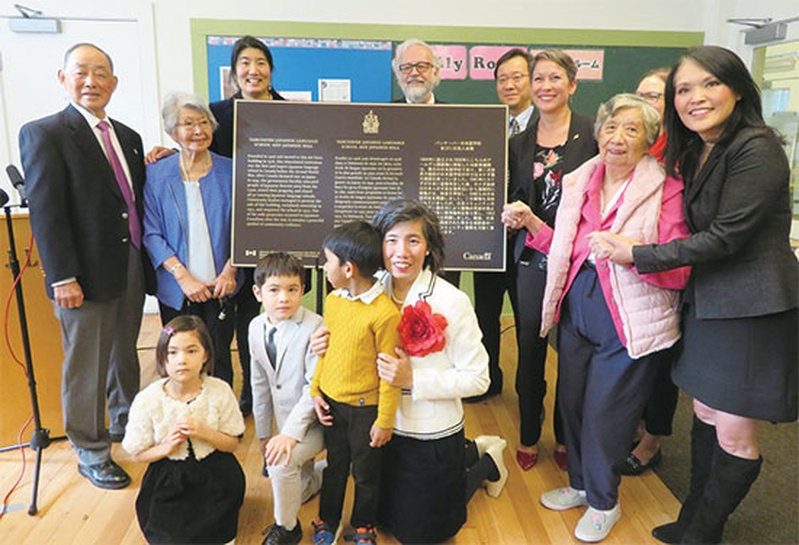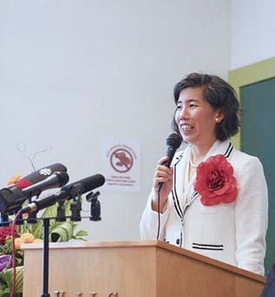A new page has been written in the history of the Japanese community. On November 13th, the Vancouver Japanese Language School and Japanese Hall (VJLS-JH), affectionately known as the Alexander Japanese Language School, which has existed as a Japanese language school and the heart of the Japanese community since before the war, was designated a National Historic Site of Canada.
A commemorative ceremony was held at the school on the same day, attended by graduates who attended the school before the war and current students, adding luster to this historic moment for a school that transcends generations.
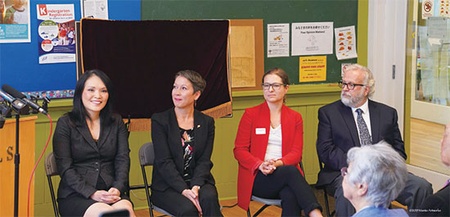
"I was so happy I almost cried"
Before the war, Japanese children who attended this school would attend nearby Strathcona Elementary School during the day, and after school they would switch to Japanese textbooks and attend the Japanese language school.
Participating on the day was Akira Horii, a Japanese-speaking Japanese doctor who treated many Issei after the war. Horii always said, "My Japanese is only what I knew up until the fifth grade when I went to Alexander." Even so, Issei who were not good at English relied on Dr. Horii. A doctor who would examine them in their native language must have been a great help to the Issei. Language has such power. That is why Japanese people before the war made their children learn Japanese. Children who wanted to play after school were sent to Japanese language schools.
Marie Kawamoto talked with joy about how she used to go to work with a bag full of ginger. "That was our snack back then," she said with a laugh. She spoke Japanese at home in those days, too. It was a unique mix of Japanese and English. "Say things like 'me wa' and 'you wa'," she said nostalgically. But now she hardly speaks Japanese. After the war, the Japanese community fell apart. As she lived in Canada, English became the main language, and Japanese became unnecessary.
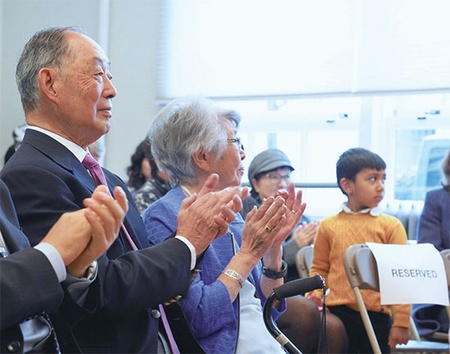
After the internment ended, this was the path that many second-generation Japanese left the country. However, the Japanese language school was returned to the hands of the Japanese community and resumed its role as a school. Third- and fourth-generation Japanese left the country are studying Japanese and inheriting Japanese culture.
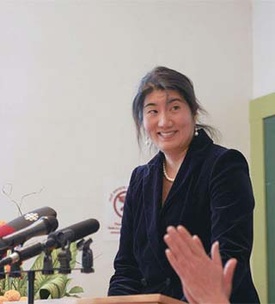
Debra Saimoto, the current chairperson of the board, is one of them. After reading her prepared Japanese speech, she laughed and said, "I broke out into a cold sweat." However, thanks to the efforts of these people, the Alexander Japanese Language School was able to regain its vitality and achieve its registration as a National Historic Site of Canada on that day.
Kawamoto said with joy, "I almost cried." Horii laughed and said, "I don't think this area will ever become a Japanese town like it used to be, but I'm glad that the Japanese language school has been registered as a national historic site and will be passed down."
Both Kawamoto and Horii are seniors who have overcome the internment experience, and they were delighted to see the Japanese language school, which had overcome the internment period and made a comeback, designated a national historic site.
The Triumph of Resilience
"Resilience." Most of the attendees used this word to describe the strength of the Japanese American community in making this national historic site a reality.
Attending the event on the day were Federal Member for the constituency Jenny Kwan, British Columbia Provincial Government Member Melanie Mark, Vancouver City Councillor Lisa Dominato, Historic Sites Commission of Canada Timothy Christian, and Consul-General of Japan in Vancouver Takashi Hatori.
Everyone who gave a congratulatory speech looked back on the history since the internment and praised the Japanese American community for "the strong will to revive the community that has brought us to this day."
Resilience can be translated as "ability to recover" or "ability to bounce back," and refers to the ability to recover and move in a positive direction even when faced with difficult situations.
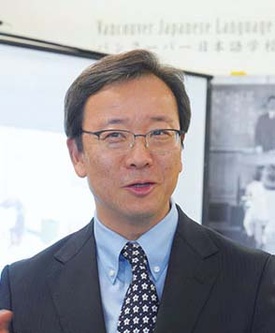
Councillor Kwan stated that it was the strong will of the Japanese people that led to the revival of the Japanese language school here and the realisation of its registration as a national historic site. He expressed his heartfelt gratitude that the Japanese language school is now accepting so many people, and offered his congratulations, saying that he saw the Japanese community's greatness as people and their strong resilience as an example of Canada's multicultural community.
Consul General Hatori congratulated the site, saying he thought it was great that it would be a valuable piece of Japanese history to be passed down in the future as a national historic site. "As the Japanese government, we hope to continue to cooperate with Japanese language schools, which play a role in spreading Japanese language and culture, as we continue to promote friendly relations with Canada," he said.
As a place of relaxation for the Japanese community and a place to spread Japanese culture
Nowadays, it is not only Japanese people who study Japanese here. People of all nationalities and races who are interested in Japan, the Japanese language, and Japanese culture come here to study Japanese and experience Japanese culture.
It hosts seasonal Japanese events and also incorporates Canadian cultural events, thus serving as a bridge between Japan and Canada.
Hanako Amaya, whose two children attend the school, said she chose the school because it has a long history and she thought it would be a good place for them to learn culture in addition to language. Her eldest son, Kaito Halverson (9), said with a shy smile, "I like the show Daruma-san ga koronda." He laughed and said that he has a lot of friends and that the school is fun. Minami (7) also attends the school. Amaya said, "I hope that Japanese-Canadians who were born and raised in Canada will have more opportunities to experience Japanese culture."
Bhavya Agarwal, an Indian-Canadian, has Ayan attending day care. She says she "really likes" the school. She can learn about Japanese customs and experience the culture. Ayan has also liked it and doesn't want to go home recently, she said, laughing. "We sing Japanese songs at home, and I've memorized them recently," she said, laughing.
The revival of the Japanese town and the future role of Japanese language schools
The Japanese community is also concerned about the situation around the Japanese language school. Powell Ground, where the Vancouver Asahi Japanese baseball team played before the war, is now Oppenheimer Park, and is now a place where many homeless people live.
The Powell Street Festival, held this August, was held at a different location than usual, without using Oppenheimer Park, because it is the Japanese community that knows best the pain of being forcibly removed from the place where they live.
The city expressed its gratitude for the decision. Councilman Dominato said he doesn't want the current situation to continue, but that it's not a problem that can be solved quickly. He said the issue is complicated and the city is working to resolve it bit by bit. Councilman Kwan echoed the sentiment.
Laura Saimoto, a board member and moderator for the event, said that issues surrounding Japanese language schools should not be ignored. "We can't say that it doesn't concern us just because it's outside the school. This is an issue for our community, and we need to work together to find a solution," she said.
He says that the registration of the National Historic Site is a good opportunity for that purpose. The plaque will be installed, the history of Japanese people will be introduced, and people will become interested and gather. Then, he says, "We can use this place as a nucleus to change the whole surrounding area."
The first step towards this future has already been taken. Renovation work on the Japanese language school will begin next year. According to Saimoto, there are three key pillars: Japanese language school, day care, and the tradition of Japanese history. The renovation is aimed at that end, and he says he will create something like a museum.
He laughs and says, "There is still a lot to do" to pass on the Japanese pride that our ancestors have protected and the history of Japanese Canada, which must never be repeated, to the future.
The registration as a national historic site is just a milestone. It is not the building that will tell the story, but the people who have been involved with it. "It is not something we can do alone. We want to work with the government and various organizations to make it a success," he said.
* * * * *
Vancouver Japanese Language School and Japanese Hall (VJSL-JH)
The school opened in 1906. A new school building was completed at its current location in 1928. Its innovative Art Deco style architecture, designed by the architectural firm that also worked on the Ballard Bridge, is eye-catching. The school was forced to close on December 7, 1941, with the outbreak of the Pacific War. At the time of closure there were 1,010 students. In 1942 the Canadian government began the forced relocation of Japanese Canadians and confiscated their property. The school building was leased to the Ministry of Defence. The policy of forced relocation of Japanese Canadians continued even after the end of the war in 1945. In 1947 the Canadian government sold half of the school building.
In 1949, the forced relocation policy ended and Japanese people were allowed to move freely. In 1952, the school building was returned thanks to the efforts of the Japanese community. Classes resumed in 1953. In 2000, the new school building and Japanese Hall were inaugurated, and Kodomo no Kuni opened, which continues to this day.
*This article is reprinted from the Vancouver Shimpo (November 21, 2019, Issue 47).
© 2019 Naomi Mishima / Vancouver Shinpo Japanese Weekly Newspaper


